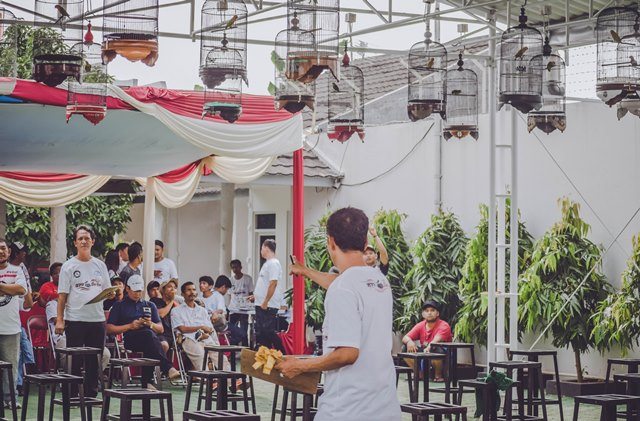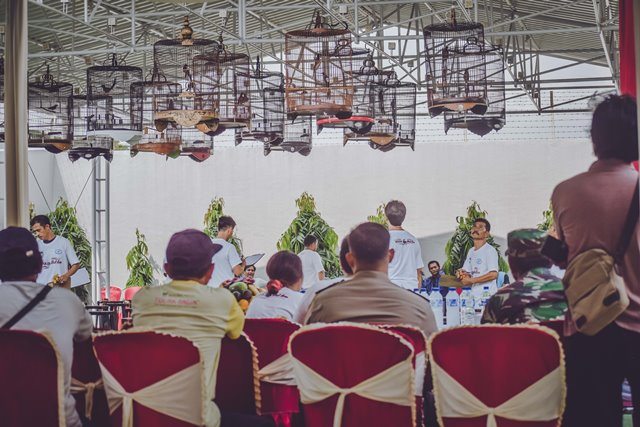Tag: Songbirds
All over Indonesia the forests are falling silent because the songbirds that once lived there are THREATENED BY EXTINCTION. We’re facing a crisis because these beautiful, remarkable and rare birds are being captured and trapped by local people to be used either in singing competitions or kept in cages as a status symbol.
Throughout Indonesia millions of birds are kept in captivity, a tradition deeply embedded in Indonesian culture. It is believed that over 1.3 million songbirds are caught ever year!
Understanding problems for species which are happening on the other side of the world can be a little tricky so we’ve put together this guide about the illegal bird trade. Take your learners through a journey through the bird markets of Indonesia using our resources to discover why songbirds face these threats and how you can help.
Our education programmes are an important part of our mission of preventing extinction. They inspire people to care about and, more importantly, take action for the natural world. We deliver a lot of our education activities with people when they visit the zoo, but we know not everyone is able to come to us.
To achieve our conservation mission, it’s important that we reach as many people as possible. So, in 2009, we took the zoo on the road and launched our free Safari Ranger outreach service, taking zoo education workshops out to schools and community groups in our local area.
We started with one Safari Ranger and a handful of workshops for primary school aged children. Over the last decade, our offer and team has grown hugely. We now work across the North West of England and into North Wales. In 2019, we delivered a huge 2,500 workshops engaging almost 80,000 participants ranging from early years groups through to university aged students, and everything in between.
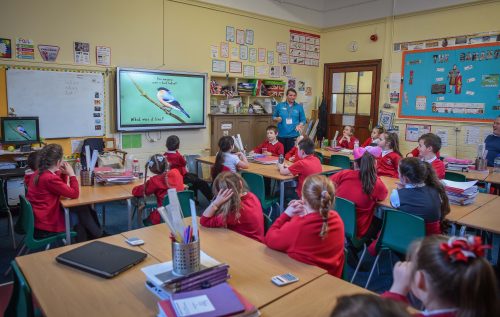
Whilst Safari Ranger workshops can be booked by any school within a 60 minute drive of the zoo, we have particularly focused our projects on those schools who might face additional barriers to visiting. We aim to work with schools who have had limited previous engagement with the zoo and who have high numbers of pupils eligible for free school meals. Projects are linked to one of our main conservation campaigns and aim to empower pupils to act for wildlife, as well as generating learning across the curriculum.
Since the pilot phase, 100s of schools have been involved in taking action for our Sing for Songbirds campaign, our Sustainable Palm Oil Challenge and more recently our Wildlife Connections campaign which focuses on the threats facing UK Wildlife. Each project involves multiple visits from our team to the school and a trip to the zoo. In some cases, families from those schools are also supported to visit the zoo with free tickets and resources linked to their children’s learning.
Since 2017 we’ve been working with Ignite TSA to inspire schools to put conservation at the heart of their curriculum, empowering pupils and teachers to act for wildlife.
Lily’s determination
All over Indonesia, forests are falling silent as the songbirds that once thrived there are threatened with extinction.
To raise funds and awareness for songbirds, 8-year-old Lily Owen was determined to take on a duathlon.

Every penny counts
Lily said: ‘I am very proud to have finished my very first duathlon and raise £178.39, because I know every penny will help save songbirds.’
‘Afterwards, I gave a talk at my school to tell everyone what I’d done and how it will make a difference. I hope other people will join in too.’
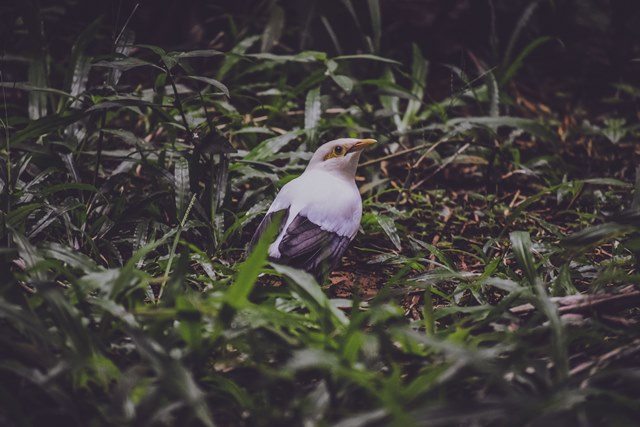
Running, cycling and then back to running again
‘I had never done anything like this before, so I’d been practising hopping on and off my bike in the garden.’
‘On the day, even though it was very hot, I knew I was ready and I could make a quick change between running and cycling, then back to running again.’

For the songbirds!
‘The hardest part was at the very end. I got a bit of stitch, but I had to keep going for the songbirds!’
Wearing her homemade songbirds t-shirt, Lily ran 200m, cycled 1km and finally ran 500m, all in 9mins and 59 seconds.
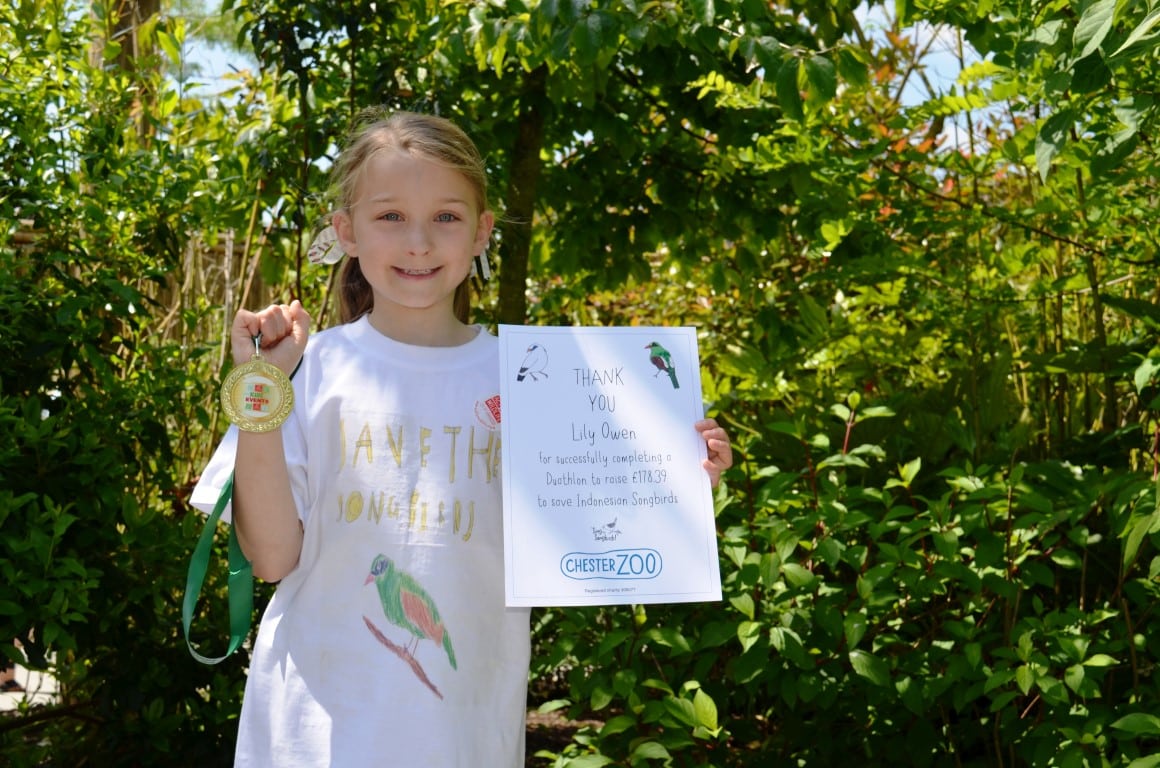
Conservationist of the future
As the daughter of our very own Chester Zoo Curator of Birds Andrew Owen, Lily is already following in her father’s footsteps and preventing extinction.
Well done Lily!
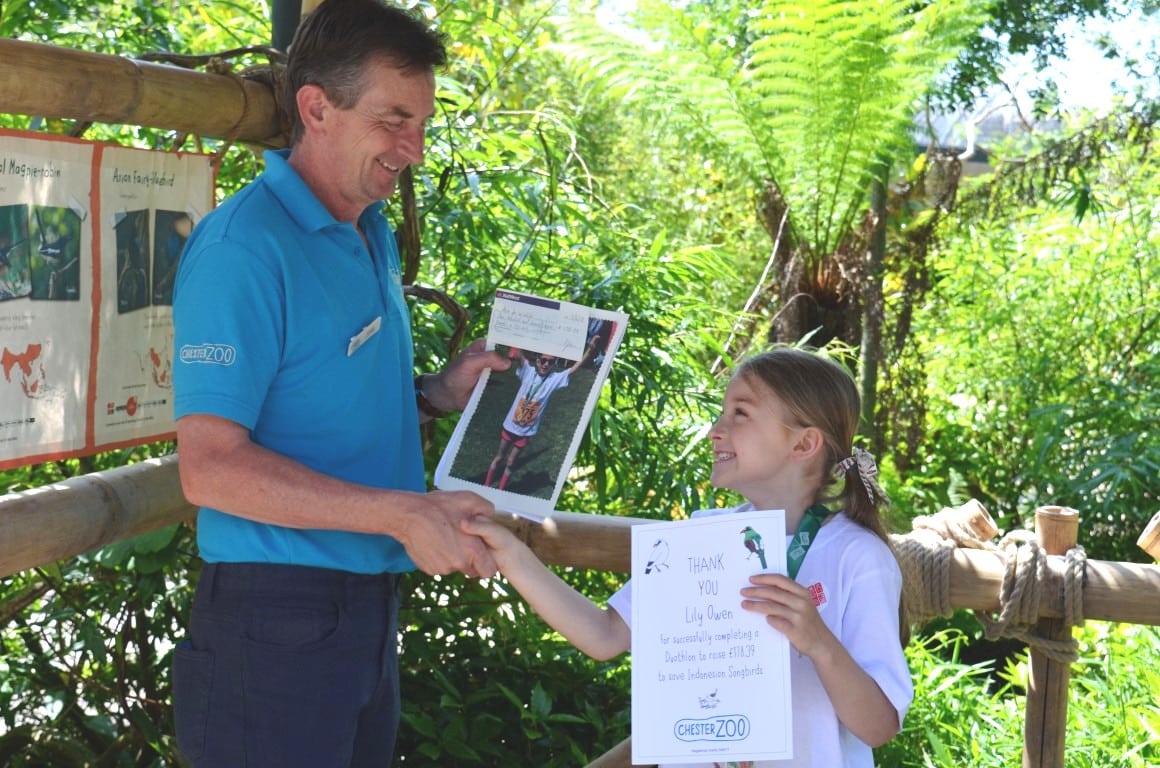
Jill Wright, Head of School at Whitefield Primary School, tells us more about how the school have taken on our Sing for Songbirds campaign and the experience they’ve had:
Whitefield School is situated in one of the most deprived wards in the country where over half the children live in poverty. Unemployment, crime and poor health feature significantly in the lives of many of our children. Their life experiences are extremely limited. It is, therefore, the school’s role to educate the children not only in formal, national curriculum subjects, but also give them access to life experiences and show them that there are possibilities for their future beyond their local community. For these reasons it is important for the school to work in partnership with other organisation. The Safari Ranger visits provided the children with access to expert knowledge and role models for future careers.
“The visit to the zoo was key to the success of the project. The children were able to see the animals they had been learning about and apply their knowledge and understanding of conservation to other animals. It also supported their spoken language skills and development of vocabulary. This was evident in philosophy discussions which took place in classes throughout the project.”
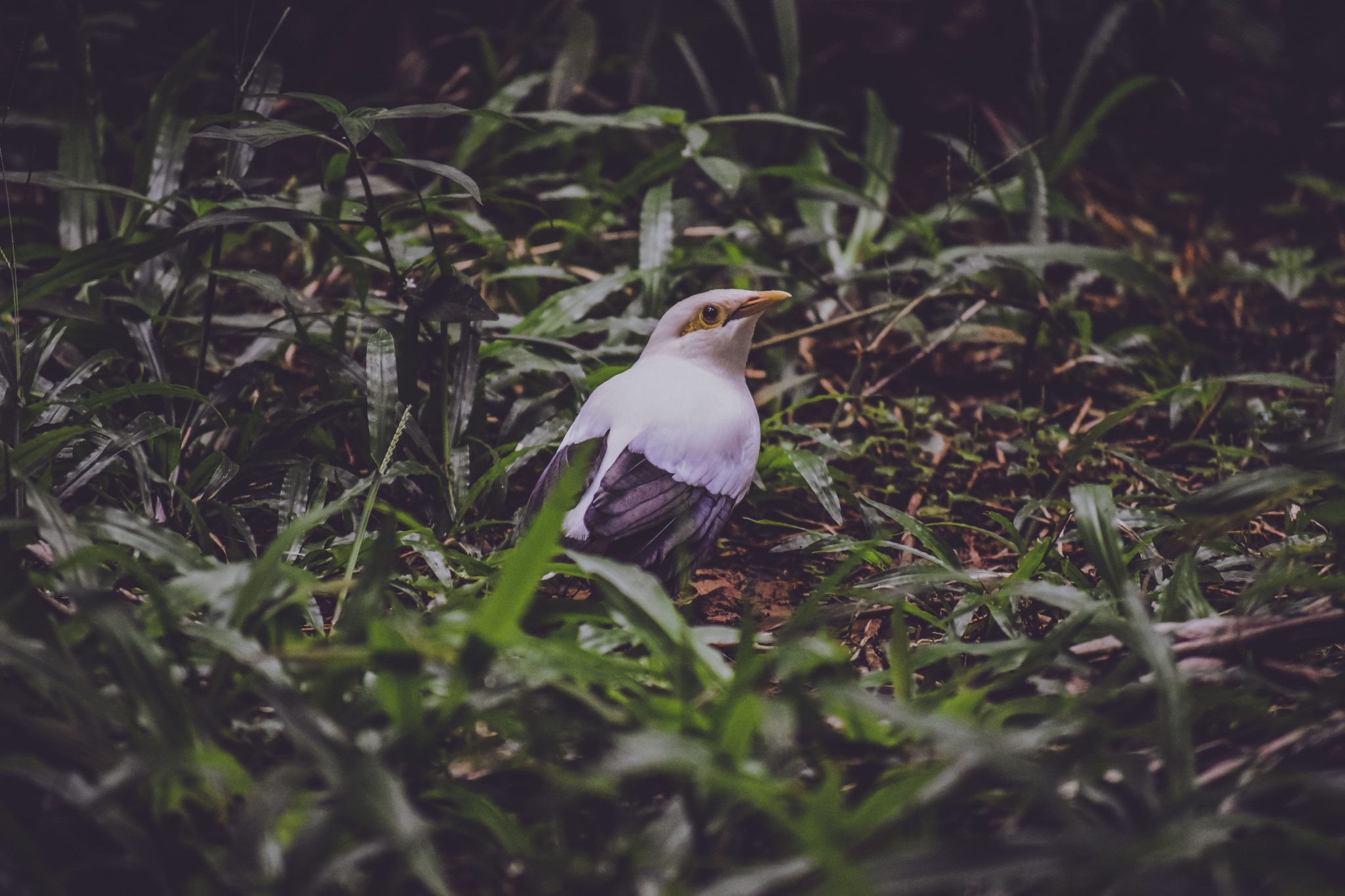
The children, teachers and families have a much better awareness of conservation through working on this project. ‘Songbirds’ is not an identified area of the current curriculum. Some year groups do focus on conservation so this fitted in with their learning. However, we decided to suspend out ‘normal’ curriculum for two weeks and focus on Songbirds. This allowed us to teach English, maths, geography, science, art, philosophy and other skills through the topic of songbirds and the children were highly motivated. We also had parent workshops throughout the two weeks where parents came to join in activities and learn about conservation from their children. This, combined with the free family tickets to the zoo meant that the project reached beyond the classroom and into the wider community.
Many of us take a day out to the zoo with family for granted. We know that our children will have the opportunity to learn about the wider world through giving them experiences beyond school. However, in areas of deprivation this is often not the case. It is up to schools, working in partnership with organisations such as the zoo to open the minds of children and families to global issues and wider opportunities. This project has certainly done that and I would have no hesitation in recommending this project to other schools.
“It has been a privilege to be involved in the songbirds project and we would welcome any further opportunities to work in partnership with the zoo. Thank you for providing an outstanding educational and life experience for the children of Everton.”
Bird trainers, almost always young men (there is an old saying in Indonesia that a man is only considered a real man if he has a house, a wife, a horse, a dagger and a bird), carry their beautifully carved, ornate cages into a small outdoor arena and hang them alongside dozens of others, all containing chirping songbirds that are to compete in a singing competition.
The contest gets underway and the men begin to yell, scream, whistle and clap to encourage their feathered protégés into continuous song. It’s a scene more associated with a crowd at a frenzied boxing match or the trading floor of the New York Stock Exchange.
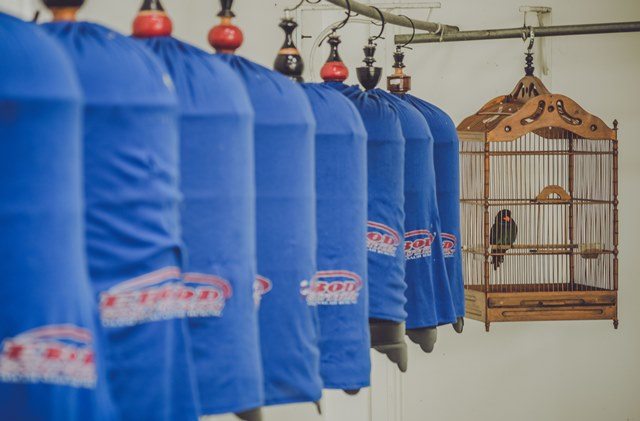

A team of judges, armed with clipboards, pace back and forth pausing momentarily under each cage to somehow distinguish individual birdsong from the cacophony. Beneath each cage is a stool upon which each of the judges places their ribbons of distinction – denoting the bird they deem to have the most impressive song. Points are awarded for melody, duration and volume.
Several minutes of frenzied chirping later and the winning trainer is declared. Promo girls step forth to pose for photos and present trophies and cheques and then it’s on to the next category. More birds are brought in and the noise begins again.
Contests like this one are regulated and will only permit entry to captive-bred birds, with organisers insisting on seeing paperwork proof and breeding licenses before allowing entry.
However, given the huge prize-pots, and glory, at stake, some bird singing enthusiasts stop at nothing to get their hands on the birds they deem to be the best. Most of the bigger contests, which draw competitors from as far afield as Thailand, Malaysia and Vietnam and which can offer top prizes of $50,000, will often be filled with birds taken illegally from the wild.
Many believe the wild caught birds sing more loudly. And, even in competitions where the prize money isn’t as big, the value of a bird can rise dramatically on the back of a win. The ‘sport’ is increasing in popularity and is endangering already threatened species that have been pushed to brink by a culture of bird-keeping that is deeply embedded in Indonesian society.
Trends for keeping certain birds mean that a number of species are in real danger of being wiped out. Some are now more readily found in bird markets like Pramuka in Jakarta – than in the forests.
The trade in songbirds in Indonesia has reached a tipping point that threatens to drive many species to extinction. Millions are captured illegally every year. It’s a conservation crisis that’s largely being ignored.
We won’t stand back and let these beautiful birds disappear from our planet. It’s now or never. It’s time to act for songbirds.
BBC – Our World
BBC science reporter, Vic Gill, recently visited Indonesia with our Chester Zoo team to discover more about the songbird crisis, the threats these precious birds are facing and what’s being done to save them.
She spent time with our project partners, Cikananga Conservation Breeding Centre, and the experts that are working around the clock to protect some of the rarest species on the planet.
You can watch the documentary BBC iPlayer now.
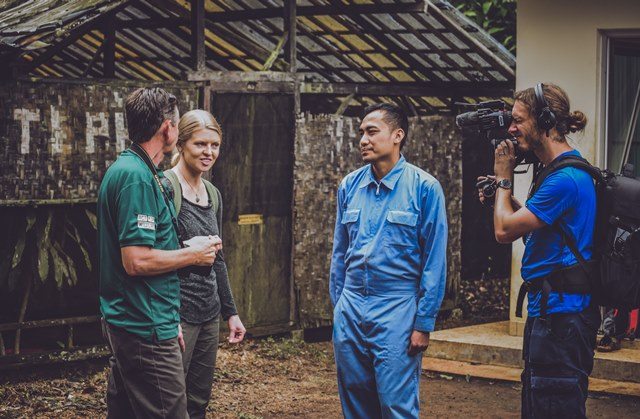
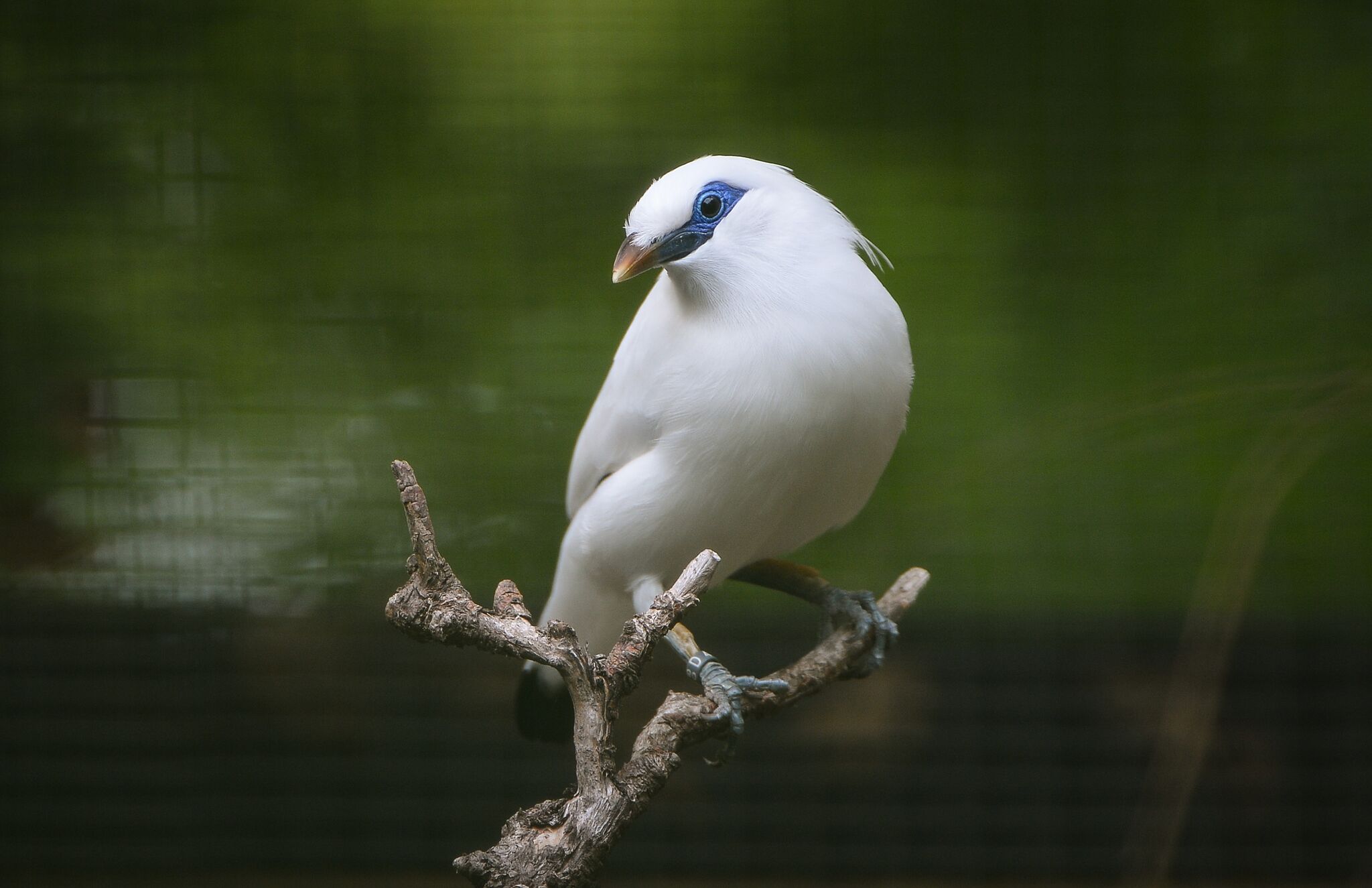
Donate to Indonesian Songbirds
Donate to our songbird project and 100% of your money will be used to help save songbirds in the wild.
Our team not only work with schools and communities in the UK, they also support our conservation partners around the world working with them to provide training, capacity building, ideas for learning resources as well as research and strategic planning for the educational elements of the projects.
